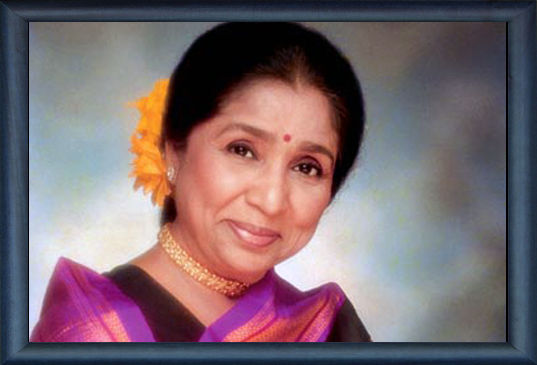Versatile. The word that effectively sums up Asha Bhosle's career. Who else can boast of having worked as extensively with trendsetting composers across three generations, from
O P Nayyar's breezy, foot-tapping ditties of the 1950s to
R D Burman's pop blitzkrieg in the 1970s to A R Rahman's sensational contemporary rhythms? Her distinctiveness arises from her enormous appetite for experimentation. She sang one of Hindi cinema's first rock 'n' roll numbers, 'Eena Meena Deeka..' way back in the 1950s. She has recorded memorable ghazals with the likes of Ghulam Ali and Jagjit Singh, pop songs with Biddu and innumerable disco numbers with Bappi Lahiri.
Asha Bhosle, one of the Mangeshkar sisters was born on September 8, 1933 to the renowed Maharashtrian parent, actor and singer Dinanath Mangeshkar in a small hamlet called 'Goar' in Maharastra. Like her elder sister
Lata Mangeshkar, Asha also initially did a small stint as a child artist. But being trained in classical music by her father Dinanath Mangeshkar it was more natural she too turn to playback singing like Lata did. In April 1942 her father Dinanath Mangeshkar died, causing upheaval in the family which moved from Pune to Kolhapur and in turn to Bombay. Around the age of ten she apparently sang her first film song in the Marathi film Majha Bal. Asha like her other sisters and brother was introduced to music at a very tender age. Asha remembers her birthplace as she says " I still remember my childhood days in sangli, because of me Lata didi use to bunk the school, I cannot forget sangli as it's my birth place ".
Asha made her playback debut in 1948 with the film Chunariya. But it took a long, long time for Asha to make it to the top. By the end of 1949 with the release of Lahore, Barsat, Andaaz and Mahal,
Lata Mangeshkar became first love of all the music directors. Asha didn't get her true share despite being equally good. Besides there were some music directors who thought of
Shamshad Begum and
Geeta Dutt first in the absence of Lata. This left Asha almost nothing. Only some low budget films, or on occasions where Lata was not available, songs came Asha's way. It was composrs like Master Krishna Dayal,
Vinod,
Hansraj Behl, Basant Prakash, Dhaniram, Sardul Quatra and others who gave songs to Asha in early days of her career. Apart from Chunariya the only film were Asha has sung is Lekh and Khel both in 1949. In Lekh she has a solo, besides a duet with
Mukesh 'Ye Kafila Hai Pyaar Ka Chalta Hi Jayega..' under the baton of Master Krishna Dayal.
The fame came to her way only after Armaan (1953). Here she sung under
S D Burman that famous song 'Chahe Kitna Mujhe Tum Bulavo Ji, Nahi Bolungi Nahi Bolungi..'. The same song was sung as duet too, with
Talat Mahmood.
And it followed with Ravi picking up where S D Burman left, in 1954 Vachan with one good song with Mohd. Rafi : 'Jab Liya Haath Mein Haath..'. This lone song gave her enough ground to establish her self firmly. But till this time it was films like Ek Do Teen (1951), Muqqaddar (1950), Ramman (1954), Saloni (1952), Bijli (1950), Naualakha Haar (1954), Jagriti (1953) and other such films with one or two songs, gave her some hope to sustain. 1957 was her breakthrough year when O P Nayyar used her to sing the heroine's songs in Tumsa Nahin Dekha and Naya Daur. The same year S. D. Burman had his rift with Lata. Also Geeta Dutt’s troubled marriage did not make her easily available . Consequently S D Burman chose to groom Asha along with O P Nayyar rather than wait for Geeta. The following year Asha made it right to the top with hit songs in films like Howrah Bridge (1958), Chalti ka Naam Ghadi (1958) and Lajwanti (1958). Asha got involved with O P Nayyar and thereafter she remained his premier singer till their break-up in the 1970s. The 1960s saw Asha at her best as she belted out her best songs particularly under O P Nayyar's baton. The 1970s also brought her close with R D Burman who gave her a new hip and happening sound altogether. 'Piya Tu Ab To Aajaa..' (Caravan), 'Dum Maro Dum..' (Hare Rama Hare Krishna), offered fresh and stimulating challenges to her voice. 'Jaane Jaan..' from Jawaani Diwaani (1972) had her switching from the higher scales to the absolute lower ones within the song with ease! 1980’s brought a lucky and prosperous year for Asha as she rocked the show with evergreen ghazals like 'Dil Cheez Kya Hai..', 'In Aankhon ki Masti..', 'Yeh Kya Jagah hai Doston..', 'Justaju Jiski Ki..' (All Umrao Jaan), a few of the finest singing. Ijaazat (1987) saw her in top form winning a National Award for 'Mera Kuchh Saamaan..', a most difficult song to sing as the lyrics were more in prose form rather than standard rhythmic verse. In the 1990s Asha has even further widened her horizon by succesfully coming out with albums in Indipop giving the albums a western touch and beating the Indian pop artists on their own turf. Though she has cut down on her singing now she still makes an Urmila Matonder or Aishwarya Rai sizzle in Rangeela (1994) or Taal (1999).
Today her vocals are in better, more supple, sensuous and inviting shape then ever before. If we listen to her singing R D Burman’s 'Teri Meri Yaari Badi Purani..', right before going on to Sandeep Chowta’s 'Kambakht Ishq..', we notice no perceptible difference in the rendition of the two tracks, even though they are separated by 30 years. 
